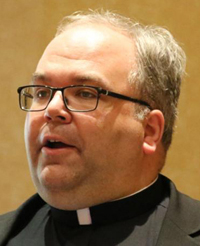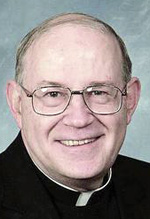The Archdiocese of Philadelphia’s new guidelines for clergy and church ministers implementing Pope Francis’ insights on marriage and family life stress that “pastors should strive to avoid both a subjectivism that ignores the truth or a rigorism that lacks mercy,” the guidelines say.
(See a PDF of the guidelines document here.)
Adopting “a sensitive pastoral approach” along with “presenting more persuasively the church’s teaching about the nature of the family and the sacrament of matrimony” is the goal of the guidelines at the parish level.
(See full coverage of the release of the guidelines here.)
One Philadelphia priest with more than 40 years as a pastor preparing couples for the sacrament of marriage is Father Joseph Quindlen, who found the new guidelines thorough and helpful not only for lay Catholics but for pastors too.
[hotblock]
“It’s helpful to be clear about what the church teaches (because) people and pastors don’t know what’s there,” said the pastor of Epiphany of Our Lord Parish in Plymouth Meeting.
That is why the guidelines are important, he believes, even though they don’t change church teaching but instead encourage pastors to propose new ways of conveying it, with an emphasis on mercy.
Catholics believe all teaching on the faith was given from Jesus to the apostles and carried on by their successors, the bishops.
“We renew and intensify the proclamation of God’s mercy through how we teach,” Father Quindlen said. “We’re all sinners trying to respond to truth as the Spirit reveals it.”
In his interviews with couples who come to the church seeking marriage or those couples already married seeking a sacrament, the priest said he begins by recognizing the spark of faith within them.
“What prompts people to come is their faith,” Father Quindlen said. “My responsibility is to affirm that faith, to explain what the teachings are and why. The culture doesn’t affirm a permanent commitment in faith.”
He then tries to strike that balance sought by Pope Francis by identifying any aspect of the person’s life that may be out of step with Jesus’ teaching for marriage and family life, and to work with him or her overtime to resolve it.
“We’re companions on the journey,” Father Quindlen said of both himself and the people he works with. “We all need help, we’re all called to conversion and change of heart, no matter what state of life. We’re called to holiness and a chaste life.”
His work with couples and family members “is both preparation and accompaniment. Both — the couple and the priest — accompanying each other,” he said. “I firmly believe that ministry is mutual.”
In addition to presenting church teaching as it regards marriage, the archdiocesan guidelines also concern family life, and in particular, regarding homosexuality.
[hotblock2]
One priest ministering to people with same-sex attraction is Father Philip Bochanski, a Philadelphia priest and national director of Courage International, a support group for homosexual people trying to live holy and chaste lives.

Father Philip Bochanski, associate director of Courage International, speaks about his ministry to homosexuals at a meeting in Warrington, England, in this February 2016 file photo. (CNS photo/Simon Caldwell)
He also has many years of experience conveying Catholic teaching with a pastoral, merciful approach, which consists of “meeting them, listening to them, showing them the path to holiness and staying with them as they try to carry it out,” he said.
“It is not, ‘these are the rules, come back to me when you’ve figured it out,’” he said. “Rather, tell me your story. You will have to make some changes in your life, but I am here to help you and walk with you.”
One problem Father Bochanski sees is that many homosexual and heterosexual people accept the cultural narrative that “life without sex is life without love.”
He believes he is in a unique position as a priest to counter that presumption and provide witness that single people can successfully integrate their chaste sexuality into their whole person.
“There is lots of love in my life — relatives, friends, other priests,” he said. “The single life is not a consolation prize but a fulfilling part of life.”
While priests or religious have a community to help them live “a sexually integrated chaste life marked by mutual prayer and support,” lay people often do not, Father Bochanski explained.
Courage International “offers that support to its members, and they give good example to others. They are witnesses to a joyful and fulfilled life. They are also an underrepresented part of the population but they’re there,” he said.
He called the homosexual people he works with closely “brave and courageous” because they are trying to live as disciples of Jesus who say, “’I want to do this but I can’t do it alone. Will you walk with me?’
“They desire a deeper relationship with Jesus,” Father Bochanski said.
PREVIOUS: Sale of archdiocese’s 213-acre Delco tract falls through
NEXT: Church ministers see new archdiocesan norms on marriage, family life



We are all called to lead a chaste life, single or married.
These pastoral guidelines for marriage and family (Pastoral Guidelines for Implementing Amoris Laetitia) are great. They are clear, conform to the Church’s teachings, and they do so in a very sensitive, respectful, and lovingly persuasive way. They fully embrace positive dialogue and emphasize the Church’s ever merciful open arms of encouragement and support, especially towards those who find themselves in situations where they must carry their crosses. These guidelines should serve as the standard for every diocese across the US.
I have a great deal of respect for Father Philip Bochanski meeting with him and being a part of Courage I found his council invaluable.
I do object and take issue with the condemnation of men and women effectively excommunicating the members of this group of Catholics because of their struggles with SSA. The refusal of communion is understandable, however having people not even allowed to participate in parish life is just disappointing.
Thank you, Fr. Phil, for sharing the good word about the Courage ministry. Your comments rebutting the general assumption that “life without sex is life without love” are particularly refreshing. Somewhere along the way we lost sight of the simple principle that love is more than just “eros” – And the many Catholics who choose to live in accordance with Church teachings are a refreshing reminder of the beauty of philia and agape.